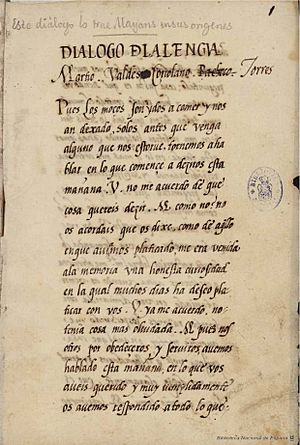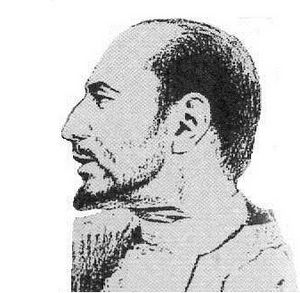Juan de Valdés facts for kids
Juan de Valdés (born around 1490 – died August 1541) was an important Spanish writer. He was also a Catholic reformer, meaning he wanted to improve the Catholic Church from within.
Juan was born in Cuenca, a city in Castile, Spain. His father, Fernando de Valdés, was a regidor, which was like a city council member. Juan had a twin brother named Alfonso. Alfonso worked for Charles V, Holy Roman Emperor, a very powerful ruler. People sometimes confused the two brothers. Alfonso passed away in 1532.
Contents
Juan de Valdés's Life Story
Juan de Valdés likely studied at the University of Alcalá. He first became known around 1528 for a book he wrote called Diálogo de Mercurio y Carón. This book talked about politics and religion. It also criticized some problems within the Roman Catholic Church.
Because of his criticisms, Juan was worried about the Spanish Inquisition. This was a powerful group that investigated people for not following Catholic rules. So, in 1530, Juan left Spain and moved to Naples, a city in Italy.
In 1531, he moved to Rome. His criticisms of the Pope's actions were accepted there. This was because his book had supported King Henry VIII of England's marriage to Catherine of Aragon.
By the autumn of 1533, Juan made Naples his permanent home. His name was even changed to sound more Italian, like Valdésso. Some people thought he became a secretary for the ruler of Naples, but there is no clear proof of this.
Juan's house in Naples became a meeting place for writers and religious thinkers. His discussions and writings, which were shared as handwritten copies, encouraged people to seek a spiritual change in the church.
His Writings and Friends
One of his first works in Naples was a book about language called Diálogo de la Lengua (1535). His writings show he was a very skilled Spanish writer. His friends wanted him to become famous for his studies of ancient languages and literature. However, Juan was more interested in understanding the Bible and how it could help people live a religious life.
He had many important friends in his group. These included Pietro Martire Vermigli and Marcantonio Flaminio. Two famous women, Vittoria Colonna and Giulia Gonzaga, also joined his discussions.
Juan had a big influence on a preacher named Ochino. Juan would give Ochino ideas for his sermons. Another friend, Pietro Carnesecchi, met Juan in Naples in 1540. Carnesecchi said Juan was "wholly intent upon the study of Holy Scripture." Juan was translating parts of the Bible into Spanish from Hebrew and Greek. Carnesecchi said Juan taught him about "justification by faith." This is a belief that people are saved by their faith in God, not just by their good actions. Juan also believed in this idea but did not want to split from the Catholic Church, unlike some other reformers.
Juan de Valdés passed away in Naples in May 1541.
After His Death
After Juan died, his group of friends broke up. Ochino and Vermigli left Italy. Some of Juan's writings were later published in Italian. These works were very original and showed deep thought. They combined a gentle, spiritual feeling with the personal charm that everyone said Juan had.
Juan de Valdés was more interested in practical religious life than in deep theological arguments. His main goal was to help people develop a strong and personal connection with God.
Juan de Valdés's Works

Here are some of the important works written by Juan de Valdés:
- Diálogo de Mercurio y Carón (around 1528): This book criticized problems in the Roman Church.
- Diálogo de la Lengua (1535): This was a book about the Spanish language.
- Alfabeto Christiano (Christian Alphabet): This book was about how to live a Christian life. It was first printed in Venice in 1546.
- Le cento e dieci divine Considerazioni (One Hundred and Ten Divine Considerations): This book contained many spiritual thoughts and ideas.
- Trataditos: These were small treatises or essays.
- Comentario Breve... sobre la Epístola de San Pablo a los Romanos (Short Commentary on the Epistle of Saint Paul to the Romans): This was a commentary on a book from the Bible. It was published in 1556.
- Comentario Breve... sobre la Primera Epístola de san Pablo a los Corintios (Short Commentary on the First Epistle of Saint Paul to the Corinthians): Another commentary on a Bible book, published in 1557.
- El Evangelio de San Mateo (The Gospel of Saint Matthew): This included the text of the Gospel and Juan's commentary on it.
- El Salterio (The Psalter): This was Juan's translation of the Psalms from Hebrew into Spanish.
See also
 In Spanish: Juan de Valdés para niños
In Spanish: Juan de Valdés para niños
 | Dorothy Vaughan |
 | Charles Henry Turner |
 | Hildrus Poindexter |
 | Henry Cecil McBay |


